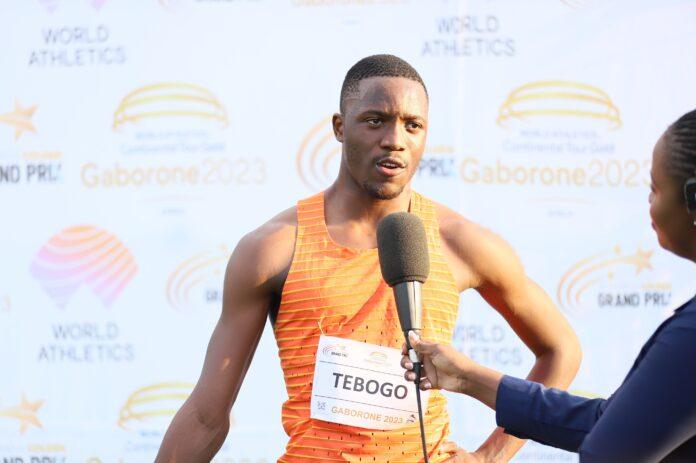Kutlo Motseta
2nd June 2025
Over the past 15 years, we have seen Botswana rise to the forefront of world athletics in the 400m and become global contenders in the event as Argentina are at every soccer world cup.
It is apparent that today’s outstanding runners were inspired by earlier generations of competitive athletes. Given the performances over the last 15 years in which Botswana has consistently been represented in the 400m at major international competitions, it is reasonable to conclude that the 400m has become a national culture.
It began with a trickle when Glody Dube, California Molefe, Obakeng Ngwigwa and Amantle Montsho made strides on the international stage in the 2000’s, culminating in the down pour of international results, led by Letsile Tebogo, who has been recognised by the World Athletics organisation as ‘The face of Africa’s sprinting revolution.’
The spark that lit the fire, started in earnest in the 1990’s when good communication between the Botswana Athletics Association (BAA) and Botswana’s sports school teachers forged healthy relations, which created useful grassroots structures. The relationship blossomed and so did the athletes.
Bobby Gaseitsiwe is a two-time Olympian, he competed at the 1988 Seoul and 1991 Barcelona Olympics in the 800m and in the 400m relay at the Seoul Olympics. He was Botswana’s athletics head national team coach and is a former CEO of Botswana National Sports Council (BNSC).
The retired industry veteran explained the basis of much of Botswana sprinting success.
“There are many things where at that time you had a program of athletes, then there was a good relationship between BAA and teachers when you have support of athlete’s teachers and athletes you can’t go wrong. There were lots of feeder programs. There were able to have trained teachers and coaches at school. After that some athletes started wining,” said Gaseitsiwe.
He said, “Obakeng Ngigwa won bronze at the 2004 Italy, California Molefe won silver at the 2006 World Indoor Championships (Moscow, Russia) Amantle Montsho added the cake when she won the world championships (Daegu 2011 World Championships in South Korea). Then it became a culture of sprinters people think we don’t have sprinters we do have … they just weren’t breaking [through to the highest ranks].”
Molefe’s delivered Botswana’s first medal at a major international competition, whilst Ngwigwa did the same at junior level.
After Montsho, Nigel Amos followed suit with the country’s first Olympic medal, winning silver in the 800m at the 2012 London Olympics.
Isaak ‘Badman’ Makwala shot to international prominence in 2014 and 2015, when he became the third person in history to enter the sub 20 and sub 44 second club in the 200m and 400m respectively, after Michael Johnson and LaShawn Merrit of the United States of America.
Baboloki Thebe and Karabo Sibanda (200m) emerged at that time, winning silver medals at the World Youth Olympics Games in in 2014. They have been relatively successful as senior 400m men athletes and have been counted amongst the best of the best.
2016 saw Botswana reach the 400m relay Rio Olympic finals. In 2017 Botswana showed that has real depth when its quartet had Batswana the sports supporters on the edge of their seats as they delivered a pulsating performance, taking silver just behind the dominant US team.
Thereafter the tide of results became a wave, which hasn’t stopped since. The most notable athletes that have performed at elite world level since 2018 being Letsile Tebogo, Anthony Pesela, Colleen Busang Kebinatshipi, Bayapo Ndori, Leungo Scotch, Tshepiso Masilela (800m), Keitlhobogile Hanguira (800m), Pako Seribe, Zibane Ngozi, Boitumelo Masilo, Laone Ditshelo, Kago Rankgwe and Ditiro Nzamani.
There have also been notable performances by Tumo Nkape (800m), Oratile Nowe (800m), Christie Botlogetswe, Lydia Jele, Victor Ntweng (400m hurdles), Kemorena Tisang (400m hurdles), Tsaone Sebele (100m and 200m), Kago Seshoka, Omphile Seribe, Keitumetse Maitseo and most recently Refilwe Murangi (100m and 200m).
In terms of the quality of athletes, at 400m national championship final is akin to an African Championship final. The top athletes don’t’ have secure places in the relay team because of the depth of talent, thus it is not possible to list all the competitive 400m athletes.
Botswana’s bronze medal at the recent world championship relay team despite fielding a ‘second team,’ which protected the country’s hopes and reputation, exemplifies its depth.
Botswana hosted its second World Athletics Continental tour in April, the FNB Golden Grand Prix, where some of the world’s best athletes competed and will ostensibly continue to do so. The nation will also host Africa’s first relay world championships next year.
Botswana clearly has abundant biological resources in the 400m. Given the growing number of aspiring athletes, which proliferated after the inspiring 2024 Paris Olympics where Botswana won delivered its best Olympic performance, it’s clear that Botswana’s 400m athletics culture is growing and can only get better with public support.









